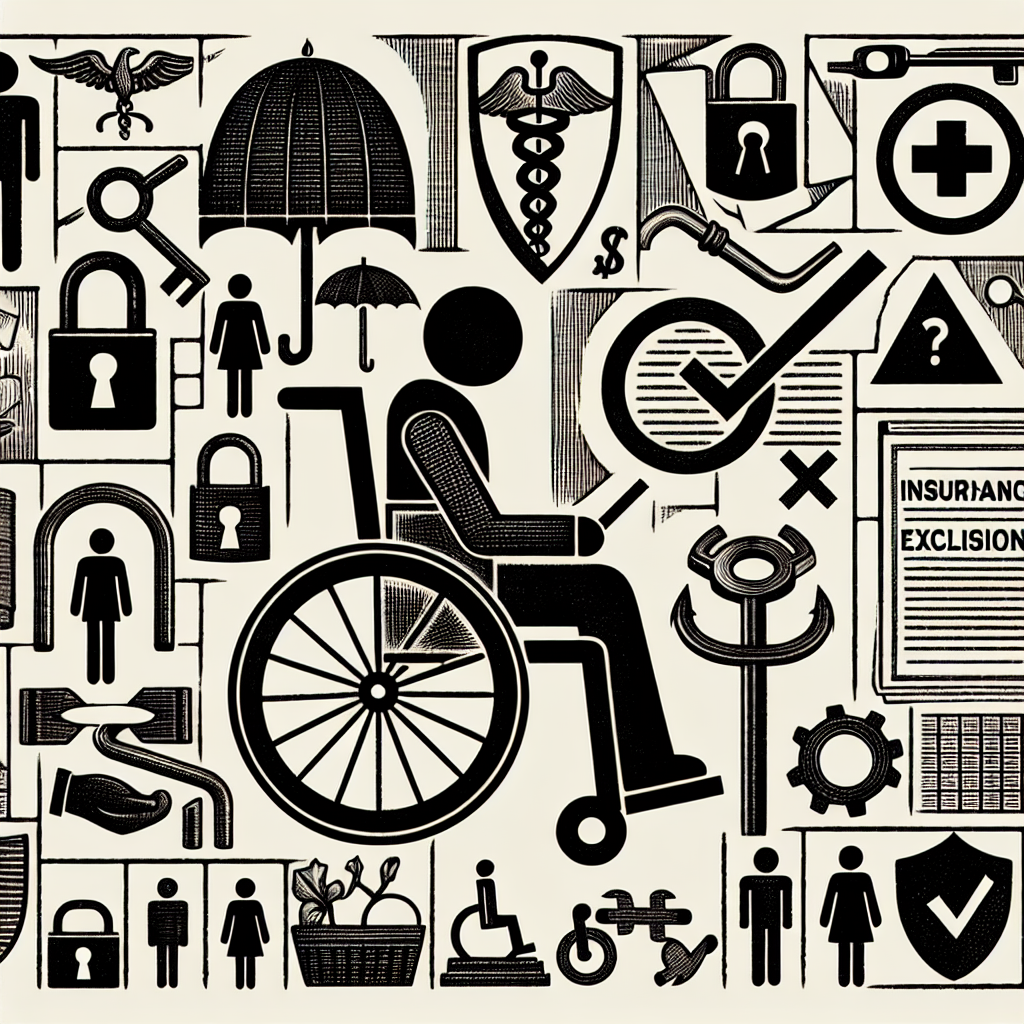Filed under Disability Insurance on
Understanding Disability Insurance Exclusions

In the world of insurance, understanding what is and isn't covered by your policy is crucial. Disability insurance, designed to provide income if you're unable to work due to illness or injury, comes with its own set of exclusions that are essential to comprehend. This guide will delve into the nuances of disability insurance exclusions, shedding light on what to expect, how to navigate these waters, and why it all matters.
What Are Disability Insurance Exclusions?
Disability insurance exclusions are specific conditions or situations not covered by a disability insurance policy. Essentially, they are exceptions that outline what benefits will not be paid under certain circumstances. Understanding these exclusions can help policyholders set realistic expectations and avoid unpleasant surprises in times of need.
Common Disability Insurance Exclusions
While exclusions can vary depending on the insurance provider and the specific policy, several common disability insurance exclusions are frequently observed:
- Pre-Existing Conditions: Many policies exclude disabilities arising from medical conditions diagnosed or treated before the policy was purchased. It's essential to read your policy carefully to understand what constitutes a pre-existing condition and how long this exclusion period lasts.
- Self-Inflicted Injuries: Disabilities resulting from self-inflicted injuries, including suicide attempts, are typically not covered.
- Acts of War: Injuries or illnesses caused by acts of war or military service are often excluded from coverage.
- Criminal Activities: Disabilities arising while committing a felony or illegal activity may result in a denial of benefits.
- Substance Abuse: Disabilities due to drug or alcohol misuse are generally not covered, although some policies might offer limited coverage if the insured is actively seeking treatment.
- Normal Pregnancy: Typical pregnancies and childbirth are often excluded, though complications arising from pregnancy could be covered differently under specific circumstances.
Why Understanding Exclusions Matters
Knowing the exclusions in your disability insurance policy is more than just a precaution—it's a critical part of financial planning. Awareness of disability insurance exclusions ensures that you're prepared for any situation that might arise and helps in selecting the proper coverage that aligns with your needs.
Avoiding Misunderstandings
One of the most frustrating experiences for policyholders is discovering ineligibility when filing a claim due to exclusions they were unaware of. Recognizing what isn’t covered allows you to make adjustments, either by opting for a rider or additional coverage that can mitigate these risks.
Prioritizing Financial Planning
Understanding the exclusions in disability insurance aids in better financial planning. Knowing potential gaps in coverage ensures preparedness and provides peace of mind, preventing future financial burden.
Evaluating Your Disability Insurance Policy
When reviewing a disability insurance policy, clarity regarding exclusions is paramount. Here are some effective strategies for evaluating these aspects:
Read the Fine Print
It might sound tedious, but meticulously reading your insurance policy, including all the fine print, is essential. Pay close attention to the list of exclusions and any definitions that clarify complex terms.
Consult with an Insurance Agent
Professional guidance can be instrumental in understanding the intricacies of your policy. An experienced insurance agent can assist in explaining disability insurance exclusions clearly, ensuring you're informed on every aspect.
Compare Different Policies
Comparing different insurers and policies can illuminate the varying exclusions and their impact. Some insurers may offer more comprehensive coverage, while others might present less favorable exclusions.
Industry Trends Affecting Disability Insurance Exclusions
The insurance industry is continually evolving, with trends influencing the way policies are underwritten, including the exclusions they feature. Here are some notable trends affecting disability insurance:
Personalization and Flexibility
Many insurers are moving towards offering more personalized policies, with the flexibility to include or exclude specific conditions according to individual risk levels. This personalization can result in more stringent or relaxed exclusions, depending on the insured's lifestyle and profession.
Technological Advancements
With the integration of technology in underwriting processes, insurers can better assess risk, possibly leading to more precise and tailored exclusions. Wearable health technology, for example, may provide data that could alter the assessment of pre-existing conditions.
Increased Focus on Mental Health
There is a growing recognition of mental health's impact on an individual’s ability to work. Consequently, some insurers are revisiting exclusions related to mental health disorders, with various strategies being employed to address these issues within disability insurance plans.
Expert Opinions on Handling Exclusions
Experts in the insurance field offer several recommendations for managing the exclusions in disability insurance:
- Regular Reviews: Regularly reviewing your policy with an advisor ensures that it continues to meet your evolving needs and lifestyle changes.
- Riders: Consider adding riders that provide coverage extensions for conditions or situations excluded from the base policy.
- Open Communication: Maintain open lines of communication with your insurer. If you're unclear about an exclusion or need documentation, don't hesitate to ask for clarification.
- Stay Informed: Staying informed about industry changes and the availability of new products can help you make informed decisions regarding your coverage.
Conclusion
Understanding disability insurance exclusions is a vital component of managing your financial security effectively. By familiarizing yourself with common exclusions, evaluating your current policy, and keeping an eye on industry trends, you can make informed decisions about your coverage. Whether you're navigating these waters alone or with the assistance of insurance professionals, awareness of the intricacies of your policy ensures that you're well-equipped to handle whatever life may bring. Through proactive measures and thoughtful planning, you can secure the protection you need and deserve, providing peace of mind and financial stability in uncertain times.



